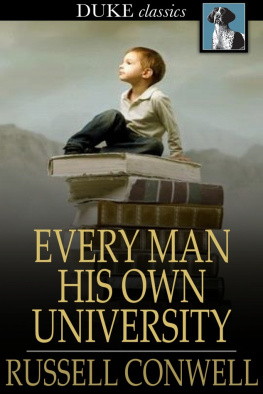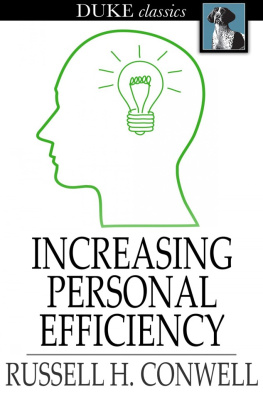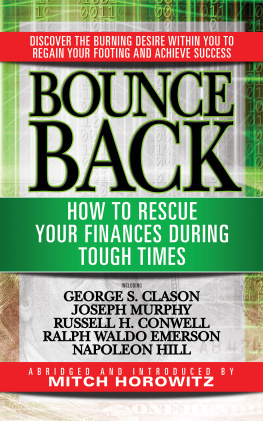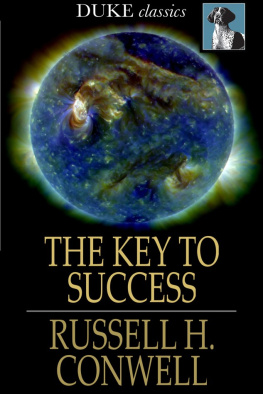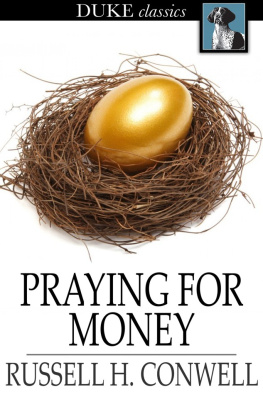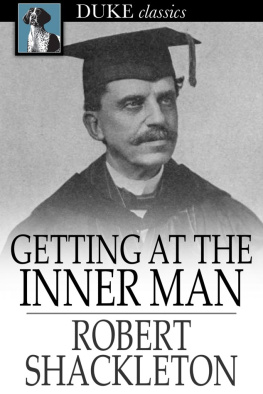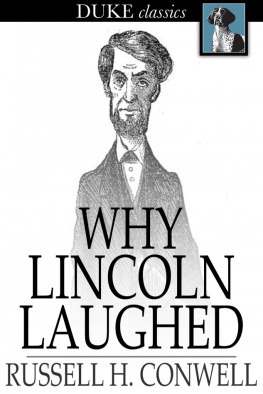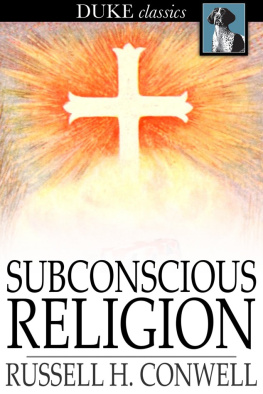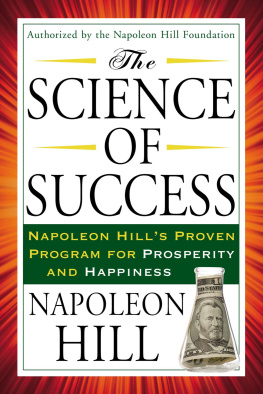EVERY MAN HIS OWN UNIVERSITY
* * *
RUSSELL CONWELL
*
Every Man His Own University
First published in 1917
ISBN 978-1-62011-772-9
Duke Classics
2012 Duke Classics and its licensors. All rights reserved.
While every effort has been used to ensure the accuracy and reliability of the information contained in this edition, Duke Classics does not assume liability or responsibility for any errors or omissions in this book. Duke Classics does not accept responsibility for loss suffered as a result of reliance upon the accuracy or currency of information contained in this book.
Contents
*
I - Every Man's University
*
A distinct university walks about under each man's hat. The only man whoachieves success in the other universities of the world, and in thelarger university of life, is the man who has first taken his graduatecourse and his post-graduate course in the university under his hat.There observation furnishes a daily change in the curriculum. Booksare not the original sources of power, but observation, which may bringto us all wide experience, deep thinking, fine feeling, and the power toact for oneself, is the very dynamo of power.
Without observation, literature and meditation are shower and sunshineupon unbroken soil. Only those schools and colleges are true schoolsand colleges which regard it as the chief business of all theirteaching to persuade those under their charge to see more perfectly whatthey are looking at, to find what they should have been unable toobserve had it not been for their school instruction. You can't make agood arrow from a pig's tail, and you can seldom get a man worth whileout of one who has gone through the early part of his life withouthaving learned to be alert when things are to be seen or heard. JohnStuart Blackie says that it is astonishing how much we all go about withour eyes wide open and see nothing, and Doctor Johnson says that somemen shall see more while riding ten miles upon the top of an omnibus,than some others shall see in riding over the continent.
How to observe should be the motto, not only in the beginning of ourlife, but throughout our career. With the same intellectual gifts,interested in the same ideas, two men walk side by side through the samescenery and meet the same people. One man has had much inspiration fromthe country traversed, and has been intent upon all that he has seen andheard among the people. The other has caught no inspiration from beautyor bird or blossom, and only the trivialities of the people have amusedhim.
A traveler in Athens or Rome, Paris or London, may be shown these citiesby a professional guide, and yet gain only a smattering of what thesecities hold in store for him, and remember little of what he has seen.Another traveler, unattended by a guide, but observant of everythingthat comes to his eyes and ears, will carry away stores from his visitto those cities, which shall be of life-long interest and beserviceable to all who shall travel his way. The solitary but observantstranger in a country almost always profits most from his travels. He iscompelled to notice boulevards and buildings, parks and people; andevery day of his travels is a lesson in observation that accustoms himto remember all he has once seen. The newspaper correspondents of otherdays had no guide-books or guides, and they were entire strangers in theplaces they visited. They relied entirely upon themselves to find theirway, and to discover everything that was valuable and interesting. Theyfound much that the modern guide either overlooks or disregards, andwrote for the papers at home what would most interest and instruct theirreaders.
When Henry M. Stanley first visited Jerusalem he insisted that thedragoman in charge of his party should keep all guides and guide-booksout of his sight. In two days Stanley knew the streets and the locationof the Temple and the Holy Sepulcher and all the notable places in thatold city. If Stanley is to-day known as one of the most intelligent oftravelers, it is mainly because he excelled in daily observation,which every one who thinks for himself recognizes as the supremeacquisition of a liberal education. He often said that he knew Rome,Naples, and Vienna far better than he knew New York, where he had livedmany years of his life. In that he resembled the rest of humanity, whogenerally know less about what is notable in their home places, thanobservant visitors know who stay there only a short time during theirtravels. What we pay for in time and labor seems more valuablenothingpay, nothing value.
A great foreign correspondent of his day, Henry W. Chambers, remainedonly six hours at Baalbek, near Damascus; yet he wrote the clearestdescription that probably ever was written of the magnificent temples atBaalbekand he wrote these descriptions, too, at Hong-Kong, after manyand varied experiences while visiting other places of greaterimportance. Many archeologists and literary men before him had visitedthe moat of the great fortress at Baalbek. Still, they had neverobserved as Chambers observed, and so they missed seeing the arrow-headsand all the other warlike instruments used in those ancient days,which had lain unnoticed among those huge pillars and greatfoundation-stones.
Although General Lew Wallace lived a long time at Jerusalem, he onlyimagined that there might have been an inner dungeon underneath thegreat prison; so when he wrote Ben Hur he put his leprous heroine intothis imaginary prison-house. A school-teacher from northern England,with her tourist-candle, afterward found the doorway of this prisonwhich Wallace had only imagined to be there. On their way from Egypt andPalestine to the Euphrates, travelers had for centuries passed over thesame path in the desert; but it was reserved for a cutter of marbleinscriptions, after all these centuries, to observe the Rosetta Stone,by the help of which archeologists can now read the inscriptions uponthe tablets in the ancient palaces of Babylon and Ninevah.
Millions and millions had seen the lid of a teakettle bobbing up anddown over the boiling water before that Scotchman, Watt, observed itwhile making watches. But he was the first of all those millions whoseclose observation led him to investigate this force of boiling water inthe teakettle. Then he applied this power to the steam-engine, which isstill the great propelling force of the world. From the time of theGarden of Eden apples had fallen in the orchards of the world, throughall the harvest-days. Of all the billions that had seen apples falling,only Sir Isaac Newton observed the law of gravitation that was involvedin their falling.
All the great discoverers began with nearly the same meager powers forobservation that the rest of the world has, but early in life came tovalue above all other mental powers this incalculable power to closelynotice; and each made his realm of observation much richer for hisdiscoveries.
Why do the majority of us go through life seeing nothing of the millionsof marvelous truths and facts while only a few keep their eyes and earswide open and every day are busy in piling up what they have observed!The loss of our instincts seems to be the price we pay to-day for thefew minor acquisitions we get from school and college; we put out ourbrains to make room for our learning. The man who assiduously cultivateshis powers of observation and thus gains daily from his experiences whathelps him to see farther and clearer everything in life that is worthseeing, has given himself a discipline that is much more important thanthe discipline of all the schools and the colleges without it. Thegreatest text-books of the greatest universities are only the records ofthe observations of some close observer whose better powers of seeingthings had been acquired mainly while he was taking his courses in thatuniversity under his hat.

